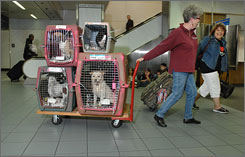 And now for the first time in decades, it has, prompting the Centers for Disease Control and Prevention to step in.
And now for the first time in decades, it has, prompting the Centers for Disease Control and Prevention to step in.
"The No. 1 thing we think about is canine rabies," said Nina Marano, head of a CDC unit responsible for drafting new regulations for dog importation.
Marano hopes to come up with ways to better screen incoming dogs and have new regulations in place by next year. Among the recent examples of cases:
•In March, a dog from India flew through Seattle-Tacoma International Airport and reached its owner in Alaska before it was diagnosed with rabies, the CDC said.
•In November 2004, a dog imported from Mexico was the first case of canine rabies in Los Angeles in more than 30 years, the county Animal Care and Control said.
•In May 2004, a dog from Puerto Rico was taken to a Massachusetts shelter to be adopted but was diagnosed with rabies, the first such case in "decades" according to the state Department of Health.
No humans were infected, but critics say it's only a matter of time before a human, or a large number of dogs, are infected if the emerging practice of importing dogs isn't regulated or stopped.
"It's a ticking time bomb," said Patti Strand, president of the National Animal Interest Alliance, a group that represents breeders, pet shop owners and others interested in animal welfare. "We've spent fortunes and decades eradicating many of these diseases, and they may be reintroduced."
Agencies in Southern California created the Border Puppy Task Force after they saw a surprising number of very young dogs being brought across the border from Mexico. The task force estimated that during a one-year span, 10,000 puppies entered San Diego County. The collection of law enforcement and animal welfare agencies has targeted "puppy peddlers" and their sometimes dangerous importing and selling practices.
The only federal requirements for bringing a dog into the USA deal with rabies. An owner must show proof of a rabies vaccination, or sign an agreement stating the dog will be confined until a vaccination is given and goes into effect. Many states have stricter requirements.
The Department of Agriculture closely monitors dealers who sell to pet stores, whether the dogs are raised or imported from other countries. Department spokesperson Jessica Milteer says her agency has no authority to monitor people who import large numbers of dogs and sell them on their own.
That gap is what concerns many in the dog industry.
Marshall Meyers, executive vice president of the Pet Industry Joint Advisory Council, said those sellers use the Internet, newspaper classifieds and street corners to sell the unregulated dogs. Meyers said those sales make up a vast majority of the international dog trade.
Shelter owners say the importation programs are safe, moral and in demand.
Marianna Massa travels to Puerto Rico several times a year to screen dogs for the Northeast Animal Shelter in Salem, Mass. She said it would be difficult to argue against the program if people saw how strays live in Puerto Rico.
"Along the highway, you see dead dogs like we see squirrels," Massa said. "People just hit them. They don't care."
Some, like Strand, say it's silly and dangerous to go overseas for dogs when there's plenty of strays here. About 4 million dogs are put to death by injection or gas every year in the USA.
"Pet overpopulation is a misnomer," she says. "What we have is a pet distribution problem."
Spay and neutering campaigns have been so successful in much of the USA — especially the Northeast and Northwest — that shelters need to look elsewhere if they want dogs to offer for adoption. But Strand says there is abundance of dogs in other parts of the country such as the South that could make up the difference.
Julie Potter, director of Northeast Animal Shelter, said they take in 800 dogs a year from the South. She said people usually want to adopt younger dogs, so they bring 200 dogs a year from Puerto Rico.
"If it's something we can do to help, why not?" Massa said.
 |
Like this article? Don’t forget to share, like or follow us |
 |
NAIA WEEKLY ROUNDUP
FEATURED & LATEST ARTICLES
GET THE NAIA WEEKLY ROUNDUP VIA EMAIL FOR FREE
Stay Connected with The NAIA: Sign Up for The Weekly Roundup
Join our FREE newsletter and community of animal advocates and receive The NAIA Weekly Roundup straight to your inbox. Stay in the loop with the latest news, events, and ways you can make a difference in the lives of animals. Sign up now to stay informed to create positive change!
Sign Up




 NAIA at CITES CoP20, Unexpected Animal Interest Alliances, and More!
NAIA at CITES CoP20, Unexpected Animal Interest Alliances, and More!
 Sanctuary Gets a Big Fine, Dogs Kill Dogsitter, and More…
Sanctuary Gets a Big Fine, Dogs Kill Dogsitter, and More…
 Weekly Roundup: Thanksgiving Week Edition
Weekly Roundup: Thanksgiving Week Edition
 NYCLASS Lawsuit, Penguin Retirement Homes, Beagle Noses, and More!
NYCLASS Lawsuit, Penguin Retirement Homes, Beagle Noses, and More!
